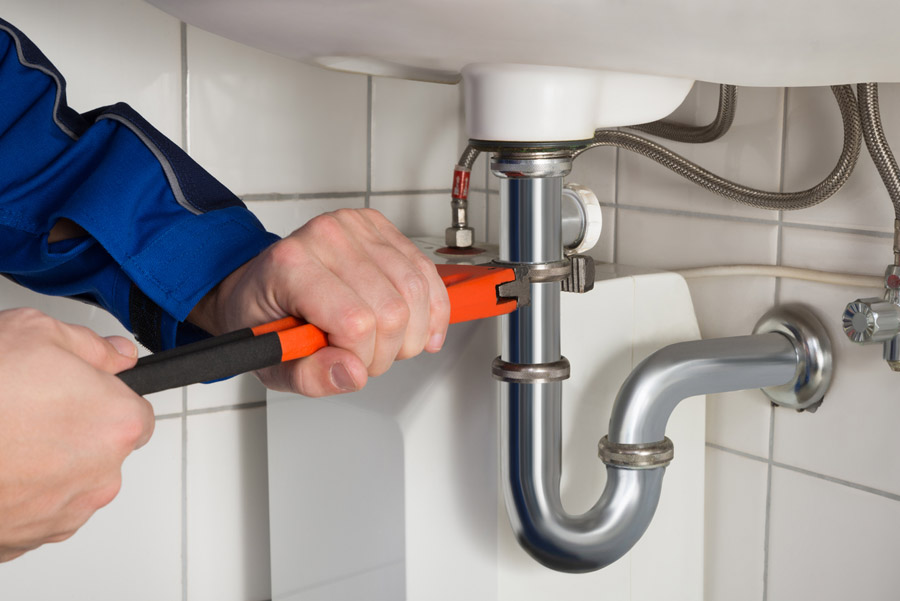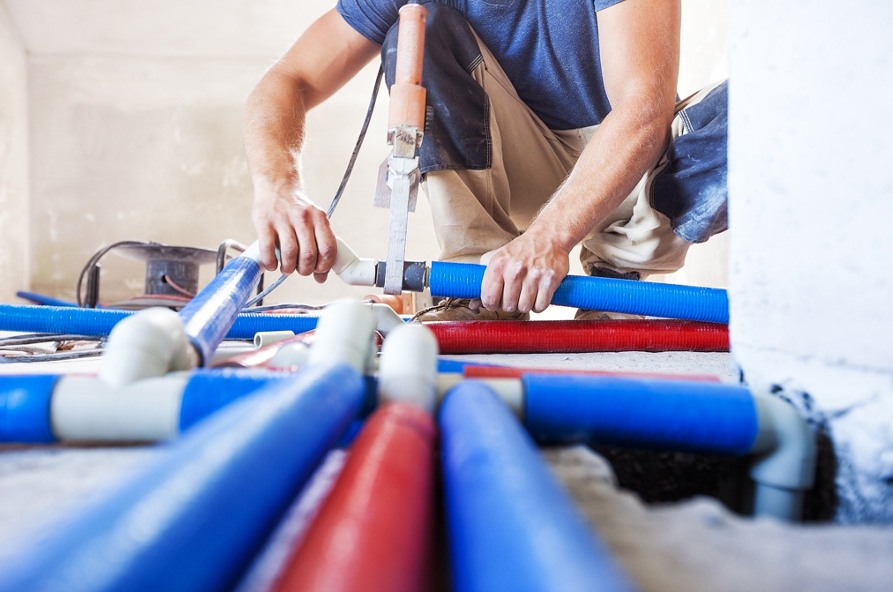Why Investing in Repiping Solutions Is Essential for Your Home's Plumbing Health
Repiping services play an important duty in preserving a home's plumbing health and wellness. With time, pipes can wear away, leak, or become blocked, resulting in prospective dangers and inadequacies. House owners commonly ignore the indications of wearing away pipes, which can cause considerable damages. Comprehending the need for repiping is crucial. What factors should property owners consider before making this financial investment? The answers might amaze you.
Understanding the Relevance of Repiping
While many house owners may ignore the value of repiping, it plays an essential function in preserving the overall health and wellness of a pipes system. Over time, pipes can wear away, create leaks, or become blocked with natural resource, resulting in minimized water top quality and circulation pressure. Repiping addresses these problems by replacing old, broken pipes with new, durable materials, ensuring a dependable supply of water and lowering the danger of expensive repair work related to leaks and water damages. In addition, contemporary piping materials are frequently more effective and eco pleasant, adding to reduced energy expenses and boosted water preservation. Performing a repiping project can boost a home's resale worth, making it a sensible financial investment for house owners. Inevitably, acknowledging the importance of repiping allows homeowners to take proactive actions in safeguarding their plumbing systems and guaranteeing a risk-free, useful living atmosphere for their family members.
Common Signs That Show the Demand for Repiping
Home owners ought to be vigilant for sure indications that suggest the need for repiping, as disregarding these problems can cause extra serious pipes problems. One typical sign is the existence of constant leaks, which can suggest aging or deteriorating pipes. In addition, a noticeable decrease in water pressure might show clogs or deterioration within the pipes system. Property owners may additionally discover tarnished or rusty water, indicating pipeline degradation. Inexplicable water costs that are significantly higher than normal can likewise hint at leaks concealed within the wall surfaces. In addition, the development of mold or mold in areas near plumbing components can suggest moisture concerns stemming from damaged pipes. If the home has old galvanized piping, it might be time to assume concerning repiping, as this material is prone to rust and corrosion. Identifying these indications early can assist preserve a healthy plumbing system.
The Dangers of Ignoring Pipes Issues
Neglecting plumbing concerns can bring about substantial water damages, which may endanger the architectural honesty of a home. Furthermore, unresolved leakages can develop an atmosphere conducive to mold and mildew growth, presenting major carcinogen to passengers. Attending to plumbing troubles promptly is necessary to protect both building and well-being.
Water Damages Problems
When pipes concerns go unaddressed, the danger of water damages intensifies considerably. Leakages, trickles, and cracks in pipes can bring about considerable water intrusion, compromising the architectural integrity of a home. With time, also small leaks can trigger rot, mold and mildew development, and damage to walls and floor covering, leading to costly fixings. Water damage can additionally affect electrical systems, developing dangerous problems. Property owners usually ignore the cumulative impact of little leakages, which can bring about prevalent damages otherwise without delay dealt with. Neglecting pipes problems not only increases the chance of prompt damages however can likewise decrease building worth and present long-lasting monetary problems. Consequently, timely repiping services are necessary to prevent water damages and preserve a healthy and balanced home environment.
Health Hazards Increase
Unsettled pipes concerns can cause considerable health and wellness hazards within a home. Contaminated water from corroded pipelines can lead and present dangerous germs to significant health problems. Mold and mildew growth, frequently a result of leaks and excess dampness, presents breathing risks and can set off allergies. Furthermore, stationary water can bring in parasites such as rodents and insects, which lug illness that even more threaten family members health. Disregarding these plumbing issues not only jeopardizes the safety of residents but can likewise diminish home value. As a result, addressing pipes problems via repiping services is essential. Prompt intervention not just safeguards health however additionally ensures a safe living atmosphere, protecting against much more substantial damages and pricey repair work down the line.
Various Types of Piping Materials
Piping products are a vital component in plumbing systems, influencing longevity, performance, and general performance. Different alternatives are readily available, each with unique residential or commercial properties and applications. Copper piping is understood for its long life and resistance to deterioration, making it a popular option for both cool and hot water lines. PVC (polyvinyl chloride) is light-weight, economical, navigate here and immune to chemical damages, primarily made use of for drain and vent systems. PEX (cross-linked polyethylene) has actually obtained appeal as a result of its flexibility and ease of installation, permitting fewer joints and possible leakage factors. Galvanized steel, though as soon as typical, is much less desirable today as a result of its sensitivity to corrosion pipeline plumbing and reduced water circulation with time. Each product provides distinct advantages and downsides, making it vital for home owners to speak with plumbing experts to figure out one of the most ideal alternative for their particular needs and problems. Selecting the appropriate piping product can substantially impact the performance and safety of a pipes system.
The Repiping Process: What to Anticipate
The repiping process starts with a detailed evaluation of the existing pipelines to identify concerns and figure out the very best strategy. Following this evaluation, homeowners will certainly need to choose proper replacement products that match their pipes needs. Ultimately, an introduction of the installment process will certainly supply insights right into what to anticipate during this considerable home enhancement.
Evaluation of Existing Pipelines
An accurate assessment of existing pipelines is important for ensuring the lasting wellness of a plumbing system. This examination entails examining the products, age, and condition of the pipes, along with identifying any type of signs of corrosion, leaks, or obstructions - Houston Repipe Specialists. Specialist plumbings commonly make use of innovative strategies such as video assessments to gain a clear view of the pipeline's interior without invasive procedures. By determining trouble locations early, home owners can prevent additional damages and pricey repair services in the future. Furthermore, recognizing the existing state of the pipes facilities help in making notified choices pertaining to needed upgrades or repiping. Generally, a comprehensive assessment works as the structure for an effective repiping process, guaranteeing that the new system meets the home's particular demands
Selecting Replacement Materials
After evaluating the existing pipelines, home owners deal with the vital decision of choosing suitable substitute products for their pipes system. Common options include copper, PVC, PEX, and CPVC, each with link unique benefits and disadvantages. Copper is recognized for its toughness and resistance to rust, making it a lasting selection. PVC is economical and lightweight, ideal for drain and air vent lines. PEX uses flexibility and is immune to scale and chlorine, making installation easier in limited rooms. CPVC resembles PVC however can endure greater temperatures. Home owners must consider elements such as spending plan, regional structure codes, and the particular needs of their plumbing system when making this choice, making sure excellent performance and long life for their home's pipes infrastructure.
Installment Process Summary
Repiping a home can be a substantial task, however recognizing the installation process assists property owners plan for what lies ahead. The process normally starts with a comprehensive inspection of the existing plumbing system to identify issue areas. Next, an in-depth plan is formulated, detailing the necessary materials and timelines. On the setup day, experts will typically begin by turning off the water supply and draining the existing pipes. They then remove the old piping, which might involve opening up wall surfaces or ceilings for access. New pipes are installed, ensuring they meet current pipes codes. Ultimately, the system is examined for leaks, and any kind of openings are fixed. Home owners can anticipate a effective and clean procedure, lessening disturbance to their day-to-days live.
Long-Term Perks of Repiping Your Home
While several property owners might ignore the significance of upgrading their pipes, the long-term benefits of repiping a home can considerably enhance both its worth and functionality. One of the key benefits is improved water high quality. Older pipelines might nurture contaminants and corrosion, while brand-new piping assurances safe and clean water distribution. Furthermore, repiping can bring about enhanced water pressure, making daily tasks a lot more reliable.

Exactly how to Pick the Right Plumbing Service for Repiping
Exactly how can house owners guarantee they select the very best pipes solution for repiping? First, they must look into neighborhood pipes companies, concentrating on those that focus on repiping solutions. Reading on the internet evaluations and testimonies can supply insights right into the high quality of solution offered. It's vital to examine for ideal licensing and insurance coverage, ensuring the picked firm follow regional guidelines
Property owners need to also ask for in-depth price quotes from several providers to contrast prices and services supplied. Involving directly with potential plumbers can aid assess their expertise, interaction skills, and willingness to answer inquiries. Additionally, requesting references from previous clients can verify a company's integrity and craftsmanship.
Finally, homeowners should think about the company's guarantee policies on products and labor, as this can reflect their commitment to high quality. By complying with these standards, homeowners can make an educated choice, securing their plumbing health and wellness through effective repiping services.
Regularly Asked Questions
The length of time Does a Regular Repiping Project Take to Total?
A regular repiping job usually takes between one to five days to complete, depending on the dimension of the home and intricacy of the pipes system. Proper planning and service provider experience can influence overall duration significantly.
Will Repiping Boost My Home's Resale Worth?
Repiping typically boosts a home's resale value, as potential customers value updated plumbing systems. This improvement reduces potential plumbing issues, making the residential or commercial property more appealing and potentially validating a higher asking rate throughout sale arrangements.
Can I Remain In My Home Throughout Repiping?
During repiping, remaining in the home is often feasible, but it may depend upon the degree of the work. Property owners ought to prepare for short-term interruptions and talk to professionals for certain arrangements and safety and security considerations.
What Is the Typical Cost of Repiping a Home?
The average price of repiping a home typically varies from $4,000 to $15,000, depending upon elements such as the size of the residence, products utilized, and labor costs connected with the pipes job. - Repiping
Do I Need a Permit for Repiping Solutions?
A permit is usually needed for repiping services, as it assures compliance with neighborhood building regulations and laws. House owners should consult their neighborhood authority or an accredited plumbing professional to identify particular allowing requirements for their location.
